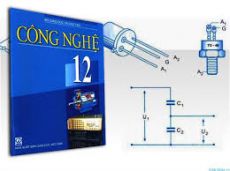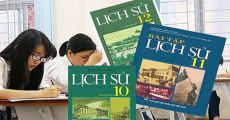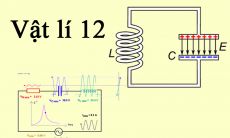Đề thi thử THPT QG năm 2022 môn Tiếng Anh
Trường THPT Trần Cao Vân
-
Mark the letter A B C, or D on your answer sheet to indicate the word whose underlined part differs from the other three in pronunciation in each of the following questions
Câu 1:
Choose the word whose underlined part differs from the other three in pronunciation: announced, evaluated, enunciated, demanded
A. announced
B. evaluated
C. enunciated
D. demanded
-
Câu 2:
Choose the word whose underlined part differs from the other three in pronunciation: volunteer, trust, fuss, judge
A. volunteer
B. trust
C. fuss
D. judge
-
Mark the letter A, B, C, or D on your answer sheet to indicate the word that differs from the other three in the position of primary stress in each of the following questions
Câu 3:
Mark the word that differs from the other three in the position of primary stress: record, mentor, timber, bother
A. record
B. mentor
C. timber
D. bother
-
Câu 4:
Mark the word that differs from the other three in the position of primary stress: catastrophe, millennium, acknowledgement, photograph
A. catastrophe
B. millennium
C. acknowledgement
D. photograph
-
Mark the letter A, B, C, or D on your answer sheet to indicate the correct answer to each of the following questions
Câu 5:
She doesn't want to go, __________?
A. doesn't she
B. did she
C. does she
D. didn’t she
-
Câu 6:
This beautiful dress __________by Mary last weekend.
A. was bought
B. has been bought
C. was buy
D. bought
-
Câu 7:
The student is quick__________ understanding what the teacher explains.
A. with
B. at
C. on
D. of
-
Câu 8:
Women's employment rate is getting __________
A. high and high
B. higher and the highest
C. high and higher
D. higher and higher
-
Câu 9:
Visitors to the local museum are mostly attracted by__________rocking chair.
A. an old wooden European beautiful
B. a beautiful old European wooden
C. an old beautiful wooden European
D. a wooden old beautiful European
-
Câu 10:
Paul noticed a job advertisement while he__________along the street.
A. was walking
B. would walk
C. walked
D. had walked
-
Câu 11:
The second-hand car Patrick bought was almost new __________it was made in the 1995s.
A. or
B. because
C. although
D. however
-
Câu 12:
Will you recognize him__________?
A. until you are seeing him
B. the moment you see him
C. after you will see him
D. as soon as you saw him
-
Câu 13:
__________in this town for a long time, Mary doesn’t want to move to another place.
A. Live
B. Having lived
C. To live
D. Seeing
-
Câu 14:
They were so __________ about joining the local volunteer group that they couldn’t sleep last night.
A. excite
B. excitement
C. exciting
D. excited
-
Câu 15:
In Viet Nam, you shouldn't __________at somebody's house on the first day of the New Year unless you have been invited by the house owner.
A. show up
B. get up
C. put up
D. go up
-
Câu 16:
She's been __________ gymnastics since she was 5 years old.
A. going
B. doing
C. playing
D. practicing
-
Câu 17:
Even though she had been studying hard, she had only a__________chance of passing the exam.
A. thin
B. narrow
C. slim
D. light
-
Câu 18:
Experts say that another outbreak of flu epidemic is on the__________.
A. days
B. boards
C. papers
D. cards
-
Câu 19:
Ian has no difficulty in __________ into use the perfect plans his friends have prepared for him.
A. lending
B. taking
C. putting
D. heading
-
Mark the letter A, B, C, or D on your answer sheet to indicate the word(s) CLOSEST in meaning to the underlined word(s) in each of the following questions
Câu 20:
Mark the the word(s) CLOSEST in meaning to the underlined word(s): The doctor is busy right now, but he could probably fit you in later.
A. look after you
B. examine your health problem
C. find time to see you
D. try to cure your illness
-
Câu 21:
Mark the the word(s) CLOSEST in meaning to the underlined word(s)His boss has had enough of his impudence, and doesn’t want to hire him anymore.
A. agreement
B. obedience
C. rudeness
D. respect
-
Mark the letter A, B, C, or D on your answer sheet to indicate the word(s) OPPOSITE in meaning to the underlined word(s) in each of the following questions
Câu 22:
Mark the the word(s) OPPOSITE in meaning to the underlined word(s): Most of the school-leavers are sanguine about the idea of going to work and earning money.
A. pessimistic
B. expected
C. fearsome
D. excited
-
Câu 23:
Mark the the word(s) OPPOSITE in meaning to the underlined word(s): We have to work against the clock so as to meet the deadline of the clients tomorrow.
A. work in a haste
B. work slowly
C. work as fast as possible
D. work strenuously
-
Mark the letter A, B, C, or D on your answer sheet to indicate the option that best completes each of the following exchanges
Câu 24:
Two students are chatting in the corridor after class.
- Tim: “Geography is certainly one of the most interesting subjects.”
- Laura: “ _______________”
A. I don't think so. You can say that again
B. I'm afraid I'm not with you. It gives me a headache
C. That's OK. As long as you like it
D. That's not true. I can't understand how you feel
-
Câu 25:
Two friends Peter and Linda are talking about pets.
- Peter: “Well, cats are very good at catching mice around the house."
- Linda: “______________”
A. Nothing more to say.
B. You can say that again.
C. Yes, I hope so.
D. No, dogs are very good, too.
-
Read the following passage and mark the letter A, B, C, or D on your answer sheet to indicate the correct word or phrase that best fits each of the numbered blanks from 26 to 30
The World Health Organization (WHO) is warning young people all over the world that they are also at risk from COVID-19. The WHO said young people are not exempt from catching the coronavirus. Many young people ___ (26)_____ believe they will not catch the virus because of their age. They think it is a disease that only older people catch. The WHO said the truth is ____ (27)____ young people are catching the coronavirus and becoming ill or dying from it. It added that young people are also spreading the disease to their parents, grandparents and _____ (28)___ people. The White House also urged young adults to follow advice and to avoid gathering in large groups to help prevent the spread of the virus.
The Director-General of the WHO said: "Today, I have a message for young people: You are not invincible." He added: "This coronavirus could put you in hospital for weeks, or even kill you. Even if you don't get sick, the choices you make about where you go could be the difference between life and death for someone else." The WHO said: "A significant proportion of patients___ (29)_____ in hospital for COVID-19 around the world are aged under 50." New York Governor Andrew Cuomo said many young people are not ___ (30)_____ the state's social-distancing rules. He told young people that: "This is a public health issue and you cannot be endangering other peoples' health."
( Source: https://breakingnewsenglish.com/)
Câu 26:
(26) __________
A. really
B. mistakenly
C. strongly
D. frequently
-
Câu 27:
(27) __________
A. why
B. what
C. that
D. when
-
Câu 28:
(28) __________
A. other
B. others
C. the others
D. the other
-
Câu 29:
(29) __________
A. to treat
B. to be treated
C. treating
D. treated
-
Câu 30:
(30) __________
A. following
B. doing
C. making
D. keeping
-
Read the following passage and mark the letter A, B, C, or D to indicate the answer to each of the question
There are many African tribes but, for many people, the Masai are the most well-known. They are famous for their bright red clothing and their ceremonies with lots of music and dancing. Probably, one of the most colorful ceremonies is the festival of "Eunoto," when the teenage boys of the Masai become men.
Eunoto lasts for many days and Masai people travel across the region to get to a special place near the border between Kenya and Tanzania. The teenage boys who travel with them are called "warriors." This is a traditional name from the past when young men fought with other tribes.
At the beginning of the ceremony, the teenagers paint their bodies while their mothers start to build a place called the "Osingira," a sacred room in the middle of the celebrations. Later, the senior elders from different tribes will sit inside this place and, at different times, the boys go inside to meet them. Later in the day, the boys run around the Osingira, going faster and faster each time.
The teenagers also have to alter their appearance at Eunoto. Masai boys' hair is very long before the ritual but they have to cut it off. In Masai culture, hair is an important symbol. For example, when a baby grows into an infant, the mother cuts the child's hair and gives the child a name. At a Masai wedding, the hair of the bride is also cut off as she becomes a woman. And so, at Eunoto, the teenage boy’s mother cuts his hair off at sunrise.
On the final day, the teenagers meet the senior elders one more time. They get this advice: "Now you are men, use your heads and knowledge." Then, people start to travel back to their homes and lands. The teenagers are no longer warriors. They are adult men and now they will get married and have children. Later in life, they will be the leaders of their communities.
(Adapted from "Life" by John Hughes, Helen Stephenson and Paul Dummett)
Câu 31:
What is the passage mainly about?
A. The ceremony that marks the beginning of Masai boys' adulthood
B. The importance of Eunoto in African people's lives
C. The journey by Masai teenage boys to the festival of Eunoto
D. The reasons for the Masai's popularity over other African tribes
-
Câu 32:
The word “them” in paragraph 3 refers to _______.
A. the boys
B. different tribes
C. the senior elders
D. their mothers
-
Câu 33:
The word “alter” in paragraph 4 is closest in meaning to _______.
A. change
B. differ
C. distinguish
D. maintain
-
Câu 34:
According to the passage, what do the teenage boys do at Eunoto?
A. Painting their bodies
B. Receiving new names
C. Changing their clothes
D. Fighting with other tribes
-
Câu 35:
According to the passage, which of the following is TRUE?
A. The Masai teenage boys are given advice from senior elders before attending Eunoto.
B. The Masai teenage boys will become adults and get married after attending Eunoto.
C. Eunoto lasts for a day across the region between Kenya and Tanzania.
D. Eunoto is the ceremony for both Masai teenage boys and girls.
-
Read the following passage and mark the letter A, B, C, or D to indicate the answer to each of the question
For hundreds of years, giving flowers has been a social means of communication. In the United States, flowers are often given during rites of passage, for commemorating special occasions or as a heartfelt gift between loved ones and friends. Flower gifting also occurs in most countries around the world. However, the meanings and traditions often vary.
While students traditionally gave their favorite teacher an apple in past years, in China, teachers are given flowers. Peonies are by far the flower most often given in China. They are also quite popularly used for weddings. Strangely, potted plants are not considered a pleasant gift among Asian cultures. The people believe that like a plant confined by a pot, the gift symbolizes a binding or restriction.
In Russia, in lieu of giving birthday presents, the guest of honor receives a single flower or an unwrapped bouquet. Floral arrangements or baskets are not given. Russians celebrate a holiday known as Woman’s Day. Traditional gifts include red roses, hyacinths or tulips. When there is a funeral or other occasion where someone wishes to express sympathy, carnations, lilies or roses are given in circular configurations, which signify the transition of birth, life and death to rebirth. In this instance, the color of choice is commonly yellow. For joyous occasions, arrangements and bouquets generally contain an odd number of flowers.
In the times of ancient Rome, brides carried flowers to scare away evil spirits and encourage fertility. The Dutch believed that flowers were food for the soul. When invited to someone’s home in Great Britain, it is tradition to bring a gift of flowers. All types are acceptable except white lilies, which are usually seen at funerals. Not unlike the United States, red roses are a symbol of love. Flowers are generally gifted in odd numbered increments regardless of the occasion. However, the Brits also have superstitions regarding the number 13, so the number is avoided.
In the southern region of the continent, flowers are traditionally given during Christmas. Egyptians are much more conservative and restrict flower gifting to funerals and weddings. While certain flowers may have significant meanings for some, flowers in Las Vegas and across the United States flowers are an accepted gift for any reason desired.
(Source: http://www.flowersofthefieldlv.com/ )
Câu 36:
What does the topic mainly discuss?
A. The fascinating tradition of giving flowers.
B. The different meaning of flowers in different cultures.
C. The comparison of giving flowers between Asian and European cultures.
D. The kinds of flowers people often give others in different cultures.
-
Câu 37:
What does the word “They” in paragraph 2 refer to?
A. Students
B. Teachers
C. Flowers
D. Peonies
-
Câu 38:
According to the passage, the following flowers are given at Woman’s Day in Russia, EXCEPT _______.
A. red roses
B. hyacinths
C. tulips
D. yellow roses
-
Câu 39:
What could the word “fertility” in paragraph 4 best be replaced by?
A. fecundity
B. good spirit
C. happiness
D. loyalty
-
Câu 40:
The word “superstitions” in paragraph 4 is closest in meaning to _______.
A. deep-seated belief
B. unfounded belief
C. religious belief
D. traditional belief
-
Câu 41:
In which country should not people bring white lilies to other houses?
A. China
B. Russia
C. Great Britain
D. United States
-
Câu 42:
It can be inferred from the passage that _______.
A. People can give flowers to the American in any occasion.
B. Egyptians are rather comfortable when receiving flowers at funerals and weddings.
C. Flowers given in Britain are in even numbers in any case.
D. At the funerals in any cultures, flowers are gifted in circular configurations.
-
Mark the letter A, B, C, or D on your answer sheet to indicate the underlined part that needs correction in each of the following questions
Câu 43:
Find the mistake: John won’t have gone to school tomorrow because he has a fever.
A. won’t
B. have gone
C. because
D. a fever
-
Câu 44:
Find the mistake: Each of the students in the accounting class has to type their own research paper this semester.
A. students
B. in the
C. their
D. own
-
Câu 45:
Find the mistake: As soon as my classmates and I were crossing the street at the zebra-crossing, a car sped up and ran toward us.
A. As soon as
B. were crossing
C. at
D. ran
-
Mark the letter A, B, C, or D on your answer sheet to indicate the sentence that is closest in meaning to each of the following questions
Câu 46:
He started to practise swimming when he was a kid.
A. Thanh practiced swimming when he was a kid.
B. Thanh has practiced swimming since he was a kid.
C. Thanh was a swimmer when he was a kid.
D. Thanh was a swimmer as a kid.
-
Câu 47:
“Don’t touch the electric wires. It might be deadly.” said Steve to Mike.
A. Steve advised Mike not touch the electric wires as it might be deadly.
B. Steve warned Mike not to touch the wires as it might be deadly.
C. Steve suggested that Mike not touch the electric wires as it might be deadly.
D. Steve accused Mike of touching the electric wires as it might be deadly.
-
Câu 48:
It isn’t necessary for us to discuss this matter in great detail.
A. We should discuss this matter in great detail.
B. We might discuss this matter in great detail.
C. We needn’t discuss this matter in great detail.
D. We mustn’t discuss this matter in great detail.
-
Mark the letter A, B, C, or D on your answer sheet to indicate the sentence that best combines each pair of sentences in the following questions
Câu 49:
The room was in a mess. I hope you won’t leave your clothes all over the floor.
A. I wish you wouldn’t leave your clothes all over the floor.
B. I expect you to clean the floor.
C. I regret not leaving your clothes all over the floor.
D. I wish you hadn’t left your clothes all over the floor.
-
Câu 50:
We arrived at airport. We realized our passports were still at home.
A. Had we arrived at the airport, we would have realized our passports were still at home.
B. Only after we realized our passports were still at home, did we arrive at the airport.
C. Only when we realized our passports were still at home, did we arrive at the airport.
D. Not until we arrived at the airport, did we realize that our passports were still at home.














